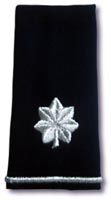 In the last 12 years I've had 10 commanders. Of those, three were absolutely horrible, six were unremarkable, and one was amazing. I've learned a lot from this group of Lt Col's over the time I've been in the Air Force. I've also learned a great deal from the lower-ranking supervisors--the DO's, Flight Commanders, and Aircraft Commanders that I've worked for and with. From the Lt Col's, unfortunately, most of it was what not to do as a leader. By the time that I had the honor of serving under the command of the best commander I ever had ("Tina" was his callsign), I had already established my style of leadership. What made him great was that he allowed me to do my job...
In the last 12 years I've had 10 commanders. Of those, three were absolutely horrible, six were unremarkable, and one was amazing. I've learned a lot from this group of Lt Col's over the time I've been in the Air Force. I've also learned a great deal from the lower-ranking supervisors--the DO's, Flight Commanders, and Aircraft Commanders that I've worked for and with. From the Lt Col's, unfortunately, most of it was what not to do as a leader. By the time that I had the honor of serving under the command of the best commander I ever had ("Tina" was his callsign), I had already established my style of leadership. What made him great was that he allowed me to do my job...The bad ones generally had one major flaw--they were excessively worried about covering their ass. In order to do this, their list of priorities went: 1) Self, 2) Mission, 3) Troops. When your list goes in that order, it doesn't take long for the people that work for you to figure it out. What I've found is that when a troop knows that the people above him are not all that interested in their welfare, they tend to take that particular subject into their own hands. When you have an organization that feels that way, and acts that way, it is destined to fail. Because then their priorities tend to shift as well--1) Self, 2) Mission, 3) Commander.
In the early 90's the Air Force rapidly sucked down it's pilot force due to overmanning. The Air Force has a habit of doing that (they're doing it right now, believe it or not). By the time I came in, they had realized their quandry of a pilot shortage and rapidly went the other way--bringing far too many pilots in. What this led to was good and bad. It was good for guys like me, who planned on making a career out of the military. The reason it was bad was that guys, when their time was up, were pretty much free to go. The airlines were hiring like crazy, and the bonus they gave us for sticking around wasn't sufficient to keep guys in. The promising guys who would have been great commanders all started to get out. What this led to was a horrible cycle: good guys would have bad commanders, and subsequently would get out, leaving nothing but poor candidates for command. They, in turn, would have no outside options to leave and, for lack of another choice, would be made commanders by the Air Force. And so it would go. SO by this point in my career, good commanders, with the right priorities, are hard to find.
That doesn't mean that they don't exist--it's just that I have to wonder sometimes if the promotion/commander selection process is broken. A lot of guys get there on brains. One of the commanders I had was brilliant, but a poor leader. He raced up the chain. Some guys got there on luck. One of the commanders I had, one of the worst ones, was put into that postion solely because the one he succeeded had to get out for medical reasons.
Tina's priorities were, in my mind, in the right order. Again, he was the only one to get it right in my career. 1) Troops, 2) Mission, 3) Self. This goes against a lot of what the Air Force teaches--that the mission always comes first. What I have found, though, is what the troops want, more than anything, is for their commander to be looking out for them. If that happens, then their priorities go in the right order as well: 1) Commander, 2) Mission, 3) Self.
If the troops are concerned with the performance and reputation of their commander, then they will do everything in their power to get the mission right. Sure, if you put mission first, then the mission gets done. But if there is personal motivation behind it, and you are doing everything you can to support your commander's visions of what the end result should be mission-wise, then the mission gets done exceptionally.
What kills me is that so many commanders don't get that. I had the best flight in my squadron when I was a flight commander. But it was that way because my number one priority was the well-being of my guys. I made sure that they had everything they needed, and the authority and support behind them, to accomplish the mission. Those guys worked harder for me than I could have ever asked them to. I could enable them to do that because Tina gave me the same support to run things the way I needed to.
He was the most hands-off, and best, commander I've ever had.
No comments:
Post a Comment